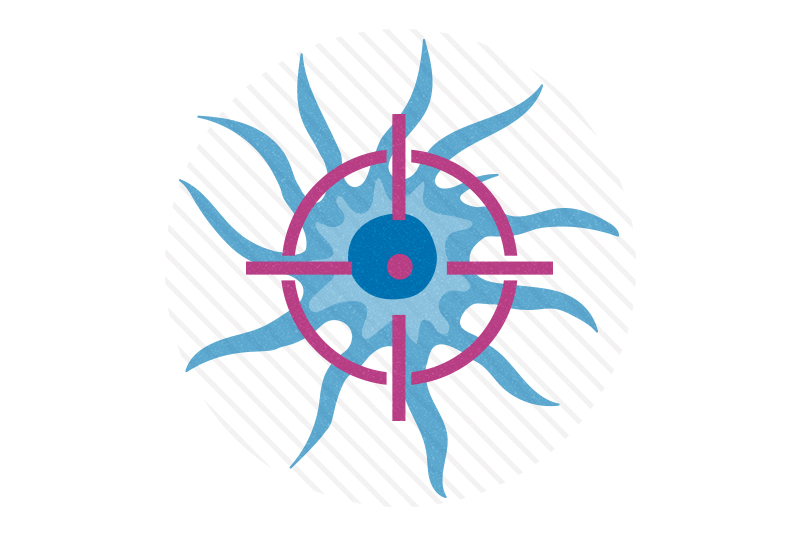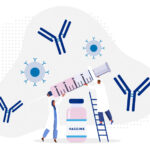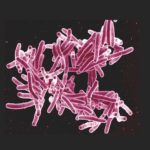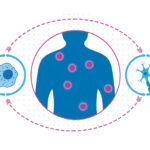Boosting vaccines for the elderly with ‘hyperactivators’

As we age our immune systems start to flag, leaving us more susceptible to cancer and infections — and less responsive to vaccines and cancer immunotherapies.
Going to the heart of the problem, Jonathan Kagan, PhD, a researcher in immunology at Boston Children’s Hospital, has identified a way to rejuvenate the elderly immune system. His team’s findings, published this month in the journal Cell, could lead to stronger vaccine adjuvants to help fight cancer and infectious diseases in older people.
Mobilizing dendritic cells
For our immune systems to effectively defend against cancer or infections, certain key things need to happen. Dendritic cells, also known as antigen-presenting cells, are first responders: They take a snapshot of the invader, travel to the lymph nodes, and show T cells the snapshot. T cells then rally: CD4 T cells activate other types of immune cells, while CD8 T cells fight invaders directly.
However, with age, dendritic cells lose their ability to migrate, so T cells never receive their intelligence. “When dendritic cells can’t migrate, it’s like having a house invader and having no phone to call the cops,” Kagan says.
On top of that, older people also make fewer T cells, in particular fewer killer CD8 T cells.
Using an elderly mouse model of cancer, Kagan’s team turned to hyperactivators, naturally occurring fatty molecules found in inflamed tissue that stimulate immune responses. Could some of these responses be useful for immunization?
“We’ve investigated hyperactivators for quite a while,” Kagan says. “We began isolating them in 2014 or 2015 and asked how they behave when added to dendritic cells.”
When the team gave hyperactivators to elderly mice, dendritic cells did indeed migrate to the lymph nodes — at more than 250 times the rate seen with commercially available vaccine adjuvants like alum and LPS.
Reviving tumor-killing ability
Although CD8 T cells were largely depleted in elderly mice, the hyperactivated dendritic cells — somewhat surprisingly — were able to induce CD4 T cells, which acquired long-lasting killer functions and were able to eradicate implanted tumors. In contrast, checkpoint inhibitors — a common type of cancer immunotherapy — did not protect elderly mice.
Kagan is further investigating how the hyperactivators mobilize dendritic cells and broader immune responses. In this study, the compounds increased numbers of a receptor called CCR7 on dendritic cells. “CCR7 senses chemokines produced in the lymph nodes,” Kagan explains. “Without the receptor, dendritic cells can’t see the signals to migrate.”
Compounds in development
Boston Children’s has filed patent applications on Kagan’s work and licensed them to Corner Therapeutics, co-founded by Kagan in 2019. (Kagan currently serves as an advisor and board member.) The company is focused on developing proprietary versions of the hyperactivators that can be used clinically.
In the lab, Kagan now wants to demonstrate that hyperactivators are effective in more human-like cancer models, as well as in infectious diseases — starting with influenza. His ultimate goal is to create cancer vaccines as well as next-generation infectious disease vaccines that mobilize dendritic cells.
“The last 10 years have been the age of T cell-targeting therapies,” he says. “But because T cells are diminishing with age, these therapies lose their usefulness as people get older. We need to diversify the targets of immunotherapies.”
Learn more about Kagan’s research
Related Posts :
-

Building better antibodies, curbing autoimmunity: New insights on B cells
When we’re vaccinated or exposed to an infection, our B cells spring into action, churning out antibodies that are ...
-

Boosting host immune defenses to treat tuberculosis
Current treatment regimens for Mycobacterium tuberculosis (Mtb), the causative agent of tuberculosis, are long, complex, and hard for people to ...
-

Nanobodies from alpacas could steer immune attacks on influenza
While conventional flu vaccines are designed to anticipate the influenza strains projected to dominate in the next flu season, they’...
-

A deeper understanding of inflammatory pain could reveal new solutions
Non-steroidal anti-inflammatory drugs (NSAIDs) such as ibuprofen are the main go-to for inflammatory pain caused by wounds, infection, sunburn, arthritis, ...





